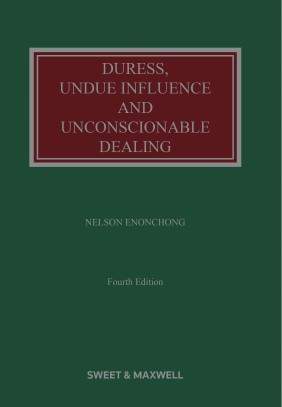Description
Duress, Undue, Influence, and Unconscionable Dealing are grounds on which a contract can be set aside because the claimant was induced to enter into it by means that the law considers unacceptable. Professor Enonchong provides a detailed and rigorous analysis of the circumstances where an otherwise valid transaction can be avoided on each of these grounds.
Duress
Duress is a common law doctrine under which a contract may be avoided where the complainant was induced to enter into it by illegitimate pressure, such as a threat of physical violence, a threat to seize or damage property, or economic pressure.
Undue Influence
There are two doctrines of undue influence: the equitable doctrine of undue influence is concerned with lifetime transactions (such as contracts), while the probate doctrine of undue influence is concerned with wills. The equitable doctrine of undue influence deals with cases where one person has acquired influence over another, and the ascendant person abuses that influence to induce the other person to enter into a lifetime transaction. It includes an evidential presumption of undue influence in certain cases. Probate undue influence applies in relation to wills. It allows the court to refuse to admit a will to probate where the testator was induced to sign the will by the exercise of undue influence. Unlike equitable undue influence, probate undue influence does not include an evidential presumption of undue influence.
Abuse of Confidence
The book also discusses the equitable doctrine of abuse of confidence, which is sometimes confused with but is different from, the equitable doctrine of undue influence. The doctrine of abuse of confidence is concerned to protect a person (the principal) who has placed confidence in another person (the fiduciary) from abuse of that confidence in any transaction between the fiduciary and the principal (as where a solicitor buys property from his client).
Unconscionable dealing
Unconscionable dealing or unconscionable bargains is an equitable doctrine that provides protection to weaker parties in certain situations. The court will intervene on this ground to set aside a contract where, at the time of the contract: one party was suffering from some serious disadvantage, such as poverty, ignorance, illness, or otherwise so that the circumstances existed of which unfair advantage could be taken; that weakness was exploited by the other party (“the stronger party”) in a morally reprehensible manner; and the resulting transaction is extremely one-sided in favor of the stronger party.
Features:
- Provides comprehensive information on all aspects of duress, undue influence and unconscionable dealing, and abuse of confidence.
- Helps you deal with problems arising from a range of contractual disputes.
- Explains the remedies and defenses available in the context of the doctrines examined in this work. Examines the different types of duress including duress to the person, duress of goods, and economic duress.
- Covers recent developments and case law relating to undue influence, including relevant Supreme Court and Court of Appeal decisions and commonwealth cases
- Includes a comparative analysis of the approach in other jurisdictions, including Australia, Canada, Hong Kong, Ireland, New Zealand, Scotland, and Singapore.
- Gives examples of how duress, undue influence, abuse of confidence, and unconscionable dealing cases work in practice.
- In the context of third-party undue influence or misrepresentation, where the loan is to a company, provides a critical examination of the circumstances where the bank may not be put on inquiry.
- Takes you through the detailed steps that a bank that is put on inquiry is required to take to avoid being fixed with constructive notice.
- Contents:
- 1. General Introduction
PART I DURESS;
2. The Nature of Duress
3. Is the Pressure Illegitimate?
4. Causation and Absence of Reasonable Alternative
5. Types of DuressPART II UNDUE INFLUENCE AND ABUSE OF CONFIDENCE;
6. Introduction to Part II
7. Equitable Undue Influence
8. Actual Undue Influence
9. Presumed Undue Influence
10. Presumed Undue Influence: A Relationship of Influence
11. Presumed Undue Influence: A Transaction that calls for an Explanation
12. Rebutting the Presumption of Undue Influence
13. Undue Influence in Probate Law
14. Abuse of ConfidencePART III UNCONSCIONABLE DEALING
15. Introduction to Part III
16. Was the Claimant at a serious Disadvantage?
17. Is the Defendant’s Conduct Unconscionable?
18. Is the Transaction Overreaching and Oppressive?
19. Independent Advice
20. Scope of Unconscionable DealingPART IV THIRD PARTY’S DURESS, UNDUE INFLUENCE, OR UNCONSCIONABLE CONDUCT
21. Introduction to Part IV
22. The Doctrine of Agency
23. Actual and Constructive Notice
24. Constructive Notice: When is a Party Put on Inquiry?
25. Steps to be Taken by a Creditor Put on Inquiry
26. Comparison with Equivalent Doctrines in Australia and ScotlandPART V REMEDIES AND DEFENCES
27. Introduction to Part V;
28. Remedies
29. Equitable Defences.


Reviews
There are no reviews yet.